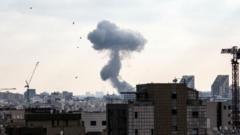**As both nations navigate a volatile landscape, the implications of their next moves could reshape the future of the Middle East.**
### US-Iran Tensions Surge: The Critical Crossroads of Diplomacy and Military Action

### US-Iran Tensions Surge: The Critical Crossroads of Diplomacy and Military Action
**Escalating military actions and diplomatic breakdowns mark a precarious moment in US-Iran relations.**
In a striking development that has sent shockwaves throughout the global political landscape, the United States has engaged in direct military strikes against Iranian nuclear facilities. This bold move by a president previously committed to diplomacy marks a significant escalation in the long-standing tensions between Washington and Tehran. The implications of this action spark immense concern, as Iran's response could have far-reaching consequences for regional stability.
Supreme Leader Ayatollah Ali Khamenei, now reportedly in hiding, has to navigate a treacherous path. With a delicate balance to strike, he risks losing credibility if he responds inadequately, yet overstepping could lead to catastrophic outcomes for Iran. Experts suggest that Khamenei's next actions will not only determine his legacy but also influence the trajectory of Iran's tumultuous relationship with the US. Analysts highlight the current tensions’ parallels to historical precedents, notably the legacies of previous Iranian political leaders.
Israel's recent military campaigns have inflicted unprecedented damage on Iran's military infrastructure, stirring fears of a cycle of retaliation. Claims of "lasting regret" have emerged from Iran, revealing the depth of their indignation, yet experts warn that they do not seek an outright war. Any military response from Iran stands to provoke significant repercussions, including potential strikes against US assets in the region, which would ignite further conflict.
Critics assert that President Trump's approach, characterized by aggressive military posturing, contrasts sharply with his earlier intentions for negotiation. Despite the Pentagon's claims of significant success in hampering Iran's nuclear ambitions, Tehran has dismissed US diplomatic overtures as insincere and demanding punitive measures that undermine its sovereignty.
This situation is compounded by international actors, with European nations urging for dialogue even as they stress that Iran must not pursue nuclear weapons. As the lines between diplomacy and military action blur, the future remains uncertain. Trump's dilemma now lies in balancing external pressure from allies like Israel against calls for restraint from domestic critics who contend that military intervention could spiral out of control.
In this complex web of geopolitical maneuvering, the stakes have never been higher for both the US and Iran, with each decision holding the potential to redefine the landscape of Middle Eastern politics and global security in the years to come.
Supreme Leader Ayatollah Ali Khamenei, now reportedly in hiding, has to navigate a treacherous path. With a delicate balance to strike, he risks losing credibility if he responds inadequately, yet overstepping could lead to catastrophic outcomes for Iran. Experts suggest that Khamenei's next actions will not only determine his legacy but also influence the trajectory of Iran's tumultuous relationship with the US. Analysts highlight the current tensions’ parallels to historical precedents, notably the legacies of previous Iranian political leaders.
Israel's recent military campaigns have inflicted unprecedented damage on Iran's military infrastructure, stirring fears of a cycle of retaliation. Claims of "lasting regret" have emerged from Iran, revealing the depth of their indignation, yet experts warn that they do not seek an outright war. Any military response from Iran stands to provoke significant repercussions, including potential strikes against US assets in the region, which would ignite further conflict.
Critics assert that President Trump's approach, characterized by aggressive military posturing, contrasts sharply with his earlier intentions for negotiation. Despite the Pentagon's claims of significant success in hampering Iran's nuclear ambitions, Tehran has dismissed US diplomatic overtures as insincere and demanding punitive measures that undermine its sovereignty.
This situation is compounded by international actors, with European nations urging for dialogue even as they stress that Iran must not pursue nuclear weapons. As the lines between diplomacy and military action blur, the future remains uncertain. Trump's dilemma now lies in balancing external pressure from allies like Israel against calls for restraint from domestic critics who contend that military intervention could spiral out of control.
In this complex web of geopolitical maneuvering, the stakes have never been higher for both the US and Iran, with each decision holding the potential to redefine the landscape of Middle Eastern politics and global security in the years to come.






















